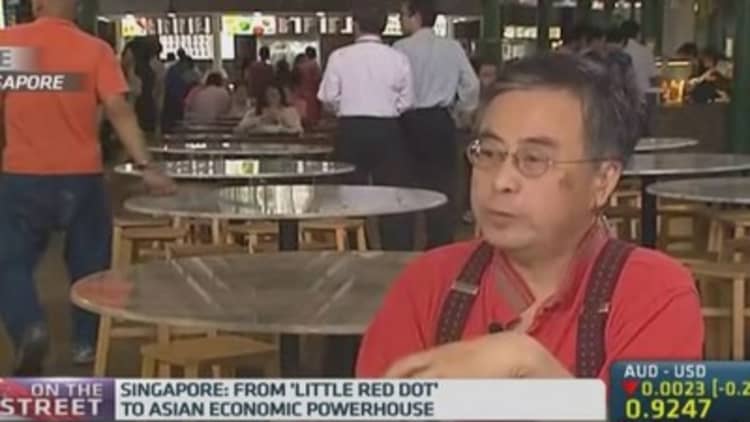The Singapore government reported this week that the nation's income inequality gap narrowed, but workers at the lower end of the spectrum are still struggling to make ends meet.
The Ministry of Finance said a steady increase in the real incomes of low and middle income Singaporeans over the past five years at the individual and household level, together with the strengthening of social safety nets and greater progress in government taxes and transfers has helped narrow the gap.
The statement was made in the MOF's third issue of its Singapore Public Sector Outcomes Review (SPOR) published Thursday.
Read MoreSingapore economy contracts in second quarter
But according to 55-year-old Tam Ming Lee, the owner of a food stall at International Plaza in central Singapore, the cost of living and running her business has not improved in recent times, but instead has become more expensive.
"Rentals are going up, so is the cost of ingredients. The 7 percent goods & services tax maybe helping the government but it's not making it any easier for businesses to cope," said Lee, adding that there is much debate about these issues circulating on social media.
"Wages also remain stagnant even if people put in long hours. The government hasn't done anything to raise wages really," she added.

Income inequality in Singapore – where the sight of expensive sports cars cruising past hawker stalls offering $3 meals is not uncommon – has received a lot of media attention recently, as workers on lower wages struggle to keep up with the high cost of living.
Singapore has one of the world's highest Gini coefficients – a measure of the income distribution of a nation's residents where zero reflects complete equality and 1 indicates complete inequality. It was logged at 0.412 in 2013, though it did decrease from 0.463 the year before.
The findings of a survey by Singaporean recruitment website JobStreet.com, reported in May, found that only 31 percent of local Singaporeans said their salary covered their basic needs and some non-essential luxuries, while 42 percent said they could only meet their basic needs.
Read MoreSingapore tourismsteps up guard against haze return
A Singaporean taxi driver, who preferred to remain unnamed, also told CNBC he feels the pressure of higher living costs.
"It's getting more expensive to live here. Three things are very high: the cost of buying a house, electricity and the cost of food. The price of a house has increased 100 percent over the past 15 years, but our pay has not gone up. The government must do something more to balance out the lower and higher incomes," he added.

According to Seng Wun Song, regional economist at CIMB Research, government initiatives aimed at helping lower income families, which have been ongoing since 2007 and are known as 'Special Transfers', have been the core reason behind the narrowing of the income gap.
"The government has given out utilities rebates for Singaporean HDB (Housing Development Board) households. Those living in one to two-bedroom HDB enjoy higher rebates,"said Song.
Read MoreSingapore zoo CEO takes a leap into the wild
"Apart from cash vouchers, there are also other assistance to help lower income families cope with rising healthcare, education and public transport costs. The government policy of curbing the growth of foreign workers, especially those with lower skill-sets, have also led to improved wage growth for residents," he added.
In March the government introduced the Wage Credit Scheme, under which it promised to co-fund a 40 percent wage increase for Singaporean employees earning a gross monthly wage of $4,000 and below, between 2013 and 2015.
Read MoreSingapore putsnew spin to mocked anti-gambling ad
The CIMB analyst told CNBC all these measures have helped counter rising food prices, which are particularly problematic for low income families.
In June food prices in Singapore rose by 3.2 percent on year, compared to a 3 percent rise in May, despite a dip in overall inflation.


